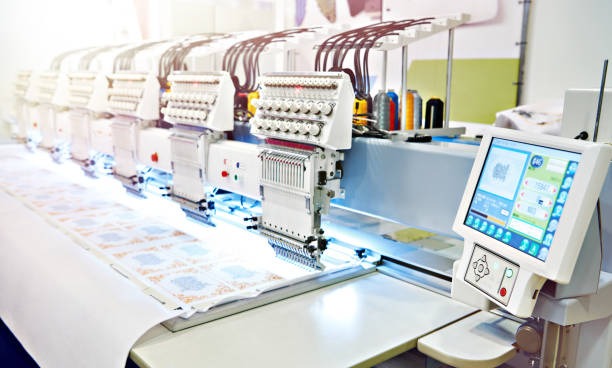Understanding Commercial Embroidery Machines
Embroidery has become essential in fashion, custom gifting, and corporate branding. As small businesses look to scale and distinguish themselves, adding embroidery services is a logical progression. For many, the leap begins with looking into a commercial embroidery machine, which is purpose-built for high-volume, professional-quality output. These machines go far beyond the capabilities of home models, featuring multiple needles for uninterrupted color changes, faster speeds, and the ability to handle intricate, large, or multi-colored designs.
The commercial embroidery machine market offers advanced technology, user-friendly interfaces, and compatibility with various materials and garment types, from T-shirts and hats to bags and uniforms. Businesses that invest in these machines can deliver polished results with far greater efficiency and reliability, meeting demand with reduced turnaround times.
Choosing the right commercial machine starts with understanding your client’s requests and business trajectory. Are you fulfilling regular bulk orders, or do you anticipate a surge in demand for personalized gear? If so, a commercial embroidery machine improves your ability to serve existing customers and positions your brand as a full-service provider capable of fast, quality-controlled production.
Commercial models can operate for prolonged periods, withstand heavier workloads, and minimize manual intervention compared to their consumer-grade counterparts. These advantages translate into social proof for your brand, as high-quality embroidered products often enjoy a premium perception among customers.
Key Benefits of Investing in a Commercial Embroidery Machine
- Increased Efficiency: Multi-needle configurations allow seamless thread changes, meaning less downtime per design and the ability to handle batch embroidery jobs effortlessly.
- Enhanced Quality: Greater precision, digitally controlled stitching, and advanced tension management systems ensure every product leaves your shop looking professional, bolstering customer satisfaction and repeat orders.
- Versatility: The flexibility to embroider on diverse materials expands your market, allowing you to produce everything from workwear and school uniforms to corporate gifts and fashion accessories.
- Scalability: As order volumes rise, especially for business-to-business clients, a commercial embroidery machine can maintain throughput without sacrificing workmanship or delivery timelines.
Cost Considerations and Return on Investment (ROI)
The cost of a commercial embroidery machine generally falls between $3,000 and over $16,000, with variations based on brand reputation, advanced features, and automation capabilities. While this may seem like a significant upfront investment, embroidery businesses can often see a swift and impressive return when market demand is strong. For instance, a shop producing custom hats with an $11 profit margin per piece could generate $17,600 in net monthly income by selling just 1,600 hats—even after covering lease or financing expenses.
In addition to direct profits, owning your embroidery equipment removes the need for costly outsourcing, ensuring consistent quality and faster turnaround times. This control allows for creative flexibility, enabling unique designs that cater to seasonal trends or urgent custom orders. By handling production in-house, businesses can adapt quickly to customer needs, maintain competitive pricing, and build stronger client relationships—all of which contribute to long-term growth and sustainability in the custom apparel market.
Maintenance and Operational Costs
Ongoing expenses require forethought before purchasing. Maintenance, periodic software upgrades, replacement needles, thread, stabilizers, and potential downtime must all be factored into annual budgeting. It’s advisable to reserve at least 5–10% of the machine price yearly to keep your embroidery machine running efficiently and to avoid expensive breakdowns that can disrupt your workflow. Proper routine care, prompt repairs, and using quality consumables are critical for ensuring your machine’s longevity and the consistency of finished products.
Additionally, employee training and digitizing software can introduce extra but worthwhile expenses, which can become significant as you expand staff or seek more complex design offerings. Choosing a reputable supplier with good customer support and spare parts availability can also mitigate longer-term operating costs.
Is It Right for Your Business?
Deciding whether to invest in a commercial embroidery machine comes down to a clear-eyed assessment of your company’s direction, customer base, and anticipated growth. Are you getting repeated requests for embroidered items, or losing business to faster competitors? Does your budget allow for a significant purchase now with a reasonable payback period? An honest evaluation of your current and future needs and research into the right machine and supplier is essential before moving ahead.
Many businesses thrive by blending embroidery with other services, such as screen printing or promotional product sales, adding stability and increased revenue streams. If embroidery fits naturally within your product mix and customer expectations, it may provide the competitive edge you seek. On the other hand, if demand remains inconsistent, it might be wiser to continue outsourcing embroidery or start with a more modest investment until sales volumes justify an upgrade.
Conclusion
Investing in a commercial embroidery machine can be a game-changing move for apparel decorators, promotional merchandise companies, and branding agencies seeking to expand their offerings. The right machine, selected with a clear understanding of your business goals and market demand, can dramatically enhance production quality, increase efficiency, and open doors to new revenue streams. Beyond producing intricate, high-quality designs, this upgrade allows you to offer personalized and branded items that appeal to a broader client base. By carefully evaluating your return on investment, streamlining internal workflows, and partnering with reputable vendors for training and support, you position your business to grow sustainably. In an increasingly competitive market, combining advanced equipment and strategic planning can set you apart, attract repeat clients, and create the foundation for long-term profitability and industry relevance.


